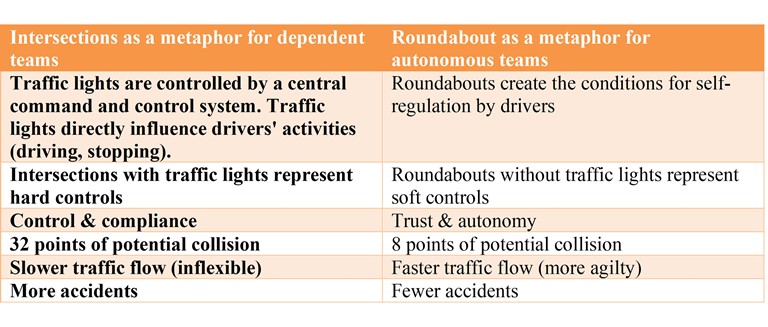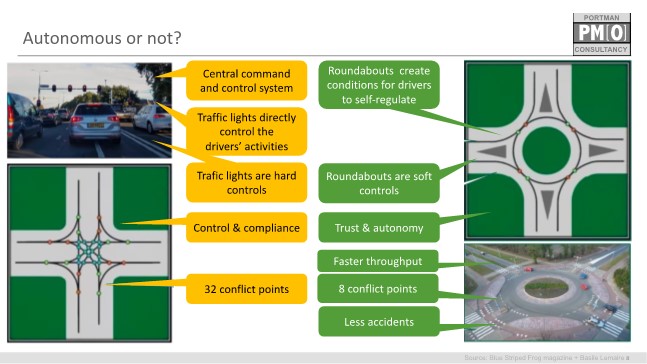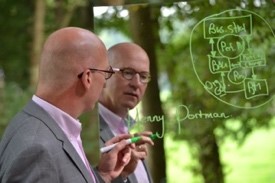Sensemaking in the Agile Forest
SERIES ARTICLE
By Henny Portman
The Netherlands
Introduction
Autonomous teams are more agile than dependent teams. And many organizations are currently striving for agility in order to quickly respond to new developments. But is an agile team always autonomous? Or can an agile team always be made autonomous?
What is autonomy?
What does ‘autonomous’ mean? It means that you are not dependent on anyone or anything. Dependent’ can have several meanings:
- Dependent on someone, a team or something
- Needing support, care or assistance from someone, a team or something
- Being in subordinate relationship to someone, a team or something.
Intersection versus roundabout
But why are autonomous teams more agile than dependent teams? To illustrate this proposition and to clarify the concepts of ‘autonomous’ and ‘dependent’, you can make a comparison with an intersection versus a roundabout. The intersection is a metaphor for dependent teams. And a roundabout is the metaphor for autonomous teams. In the table below you will find important differences in characteristics.


Decision-making
An important aspect in which autonomy is expressed is decision-making: can you, as a team, make decisions yourself or do you have to escalate? The importance of autonomy is also reflected in the research of The Standish Group. This organization has conducted research into the causes of project failure. One of the most important reasons is the excessively long lead time required to make decisions. This is also referred to as ‘decision latency’. It is therefore important to have decisive decision-making and therefore sufficient autonomy.
More…
To read entire article, click here
Editor’s note: This is the second article in a series by Henny Portman, one of the world’s leading authorities on “agile”. Based in The Netherlands, Henny coined the term “agile forest” in 2019 to describe the many agile frameworks that have emerged over the last 20 years. This series is intended to help readers better understand the agile concept, navigate through the ‘underbrush’ and more successfully apply whichever framework is selected for their projects.
How to cite this article: Portman, H. (2022). Is an agile team always autonomous? Sensemaking in the Agile Forest series, PM World Journal, Vol. XI, Issue VI, June. Available online at https://pmworldlibrary.net/wp-content/uploads/2022/05/pmwj118-Jun2022-Portman-Is-an-agile-team-always-autonomous.pdf
About the Author

Henny Portman
The Netherlands
![]()
Henny Portman, owner of Portman PM[O] Consultancy and was partner of HWP Consulting, has 40 years of experience in the project management domain. He was the project management office (PMO) thought leader within NN Group and responsible for the introduction and application of the PMO methodologies (portfolio, program, and project management) across Europe and Asia. He trains, coaches, and directs (senior) programme, project and portfolio managers and project sponsors at all levels, and has built several professional (PM(O)) communities.
Henny Portman is accredited in a variety of qualifications, including P3O, PRINCE2, MSP, MoP, PRINCE2 Agile, AgilePM, AgilePgM and AgileSHIFT trainer and an SPC4 SAFe consultant and trainer. He is a P3M3 trainer and assessor and PMO Value Ring Certified Consultant (PMO Global Alliance). On behalf of IPMA, he assesses mega and large projects for the IPMA Project Excellence Award. In addition to this, he is an international speaker, author of many articles and books in the PM(O) field, and an active blogger – hennyportman.wordpress.com
Henny can be contacted at henny.portman@gmail.com
To view other works by Henny Portman, visit his author showcase in the PM World Library at https://pmworldlibrary.net/authors/henny-portman/









